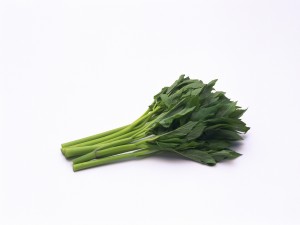Ashitaba: The ‘Longevity Herb’ Is a Plant with Real Promise


By Ginger Hultin, MS, RDN, LDN
Known as the ‘longevity herb,’ Ashitaba is used medicinally for many conditions and shows evidence of exhibiting anti-inflammatory and antioxidant effects. This herb is native to Japan and though used primarily in Asia both in the diet and as a dietary supplement, is gaining popularity in the U.S. because of its promising health effects. There are many other names for Ashitaba including Japanese Ashitaba, Angelica keiskei, Kenso or Leaves of Tomorrow. Ashitaba leaves are consumed within the diet as food or juiced in some cultures but can also be used in powdered form or topically. The health benefit of ashitaba is thought to be associated with vitamin and mineral levels in the plant including B vitamins, beta-carotene, vitamin C, calcium, magnesium and potassium along with a variety of antioxidants called chaloconoids including xanthoangelol which is mentioned in many studies on this medicinal plant.
Health Benefits
There is some evidence that ashitaba is effective for gastroesophageal reflux (GERD) and peptic ulcers because of its ability to reduce stomach secretions. One study took compounds from ashitaba called xanthoangelol and 4-hydroxyderricin and saw that the higher the dose given in an animal study, the less acid was secreted. Ashitaba has also shown promise for decreasing blood sugars and is used in traditional medicine as an ‘anti-diabetic’ plant. One study showed that six compounds derived from ashitaba exhibited effects that could help lower blood sugar.
Ashitaba has also been shown to exhibit anti-cancer effects. Aside from the antioxidant, anti-inflammatory and anti-thrombotic effects which may contribute to this effect, one study showed that both neuroblastoma and leukemia cells experienced toxic effects when exposed to ashitaba extract xanthoangelol.
Ashitaba has also been studied for its role in cardiovascular health including decreasing blood pressure, as an antithrombotic (anti-clotting agent) and to increase good cholesterol (HDL) and decrease triglycerides. Research done on rats prone to stroke found that the ashitaba extract xathoangelol may decrease bad cholesterol (LDL), triglyceride levels and blood pressure while raising good cholesterol.
Studies have also shown antioxidant and anti-inflammatory promise related to ashitaba. Again using extract xanthoangelol, one study found that this compound decreased inflammation in vascular endothelial cells which line the circulatory system and play a role in cardiovascular health. A recent study from 2015 again found that ashitaba extract reduced cholesterol, blood sugar and insulin, triglyceride levels in rats.
Finally, there appears to be potent anti-platelet activity in ashitaba compounds meaning that it could be a helpful blood thinner for those prone to excessive clotting.
 Unfortunately, there have not been extensive human studies performed on ashitaba so the safety and effectiveness are largely unknown. Much of the research done has taken place in vitro, or studied outside of the body or normal biological context, or on animals. Natural Medicine’s Database does not have sufficient evidence to list potential reactions, herb/supplement or drug interactions or proper dosage. That being said, it has been used for thousands of years and animal studies do not show toxic levels. There was a recent study done in 2015 that dosed rats on ashitaba yellow sap powder up to 1000mg per kg per day where no toxicological concerns were noted. This study found the extract to be safe in rats though that doesn’t yet prove safety in humans. Dosing and Safety
Unfortunately, there have not been extensive human studies performed on ashitaba so the safety and effectiveness are largely unknown. Much of the research done has taken place in vitro, or studied outside of the body or normal biological context, or on animals. Natural Medicine’s Database does not have sufficient evidence to list potential reactions, herb/supplement or drug interactions or proper dosage. That being said, it has been used for thousands of years and animal studies do not show toxic levels. There was a recent study done in 2015 that dosed rats on ashitaba yellow sap powder up to 1000mg per kg per day where no toxicological concerns were noted. This study found the extract to be safe in rats though that doesn’t yet prove safety in humans. Dosing and Safety
Given the potential for which ashitaba is being studied medicinally, there should likely be caution taken with any drugs or other supplements that cause similar effects such as decreasing blood pressure, decreasing blood sugar, or for blood thinning. It is important to talk to your doctor and pharmacist about the safety of adding this type of herb given your unique needs and medical history.
Keep in mind that Ashitaba is different than Gynura Procumbens which has similarly shaped leaves and are often confused. Gynura Procumbens is used in Chinese herbal medicine to decrease blood pressure and blood sugar levels. There have been some animal studies that show these effects are possible. Gynura Procumbens leaves are also simply included in the general die and are used in African medicine, mostly externally as a poultice. Be sure that whichever herb you are after, you are getting the true variety of either ashitaba or gynura procumbens as they are different plants.
Ginger Hultin, MS, RD, CSO, LDN, is a health writer and owner of Champagne Nutrition specializing in integrative health and whole food-based nutrition. She serves as Immediate Past President for the Chicago Academy of Nutrition and Dietetics, Chair-Elect of the Vegetarian Nutrition Dietetic Practice Group and is a Media Representative for the Illinois Academy. Read Ginger’s blog, Champagne Nutrition, and follow her on Facebook, Twitter, Instagram and Pinterest.
Ginger Hultin MS RD CSO LDN
gingerhultin@hotmail.com | @GingerHultinRD
Chair-Elect, Vegetarian Nutrition Dietetic Practice Group
ChampagneNutrition.com
